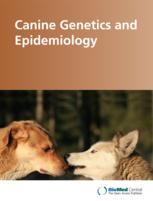Canine Genetics and Epidemiology is a peer-reviewed, open access, online journal publishing original research and review articles relating to all aspects of canine genetics and epidemiology.
This resource provides access to many articles of interest to the dog community. Here we highlight one which is particularly well-matched with DogWellNet's focus.
The challenges of pedigree dog health: approaches to combating inherited disease.
ARTICLE: "Conclusion
In this review we provide an overview of the challenges facing breeders of pedigree dog breeds in combating inherited disease. Incentive programs, free diagnostic screening, and genetic testing days are already being implemented by breed clubs to help identify and diagnose inherited disorders in susceptible dog breeds, but public awareness of the importance of testing needs to be much improved. Testing and screening programs are vital to understanding both the prevalence and susceptibility to developing disease and creating breeding strategies with the aim of significantly reducing inherited disorders. DNA tests for disease causing mutation(s) will be most informative and effective for disease management but must be combined with current screening schemes, pedigree information, and if possible genomic selection, to maximize the impact in significantly reducing the number of inherited disorders and improving overall health in pedigree dogs. Recognition of the benefits of crossbreeding, acceptance for registration of dogs with a distant ancestor of another breed, and offspring limits imposed on stud dogs in Kennel Clubs worldwide would improve breed health without compromising many breed standards. Public awareness, education, and most importantly the support of breeders and/or breed clubs are significant factors in making these changes successful and common practice."
This article is referenced in Gregoire Leroy's Blog Post: Pride and crossbreeding at: http://dogwellnet.com/blogs/entry/43-pride-and-crossbreeding/
 Donate
Donate
Recommended Comments
There are no comments to display.
Join the conversation
You can post now and register later. If you have an account, sign in now to post with your account.
Note: Your post will require moderator approval before it will be visible.